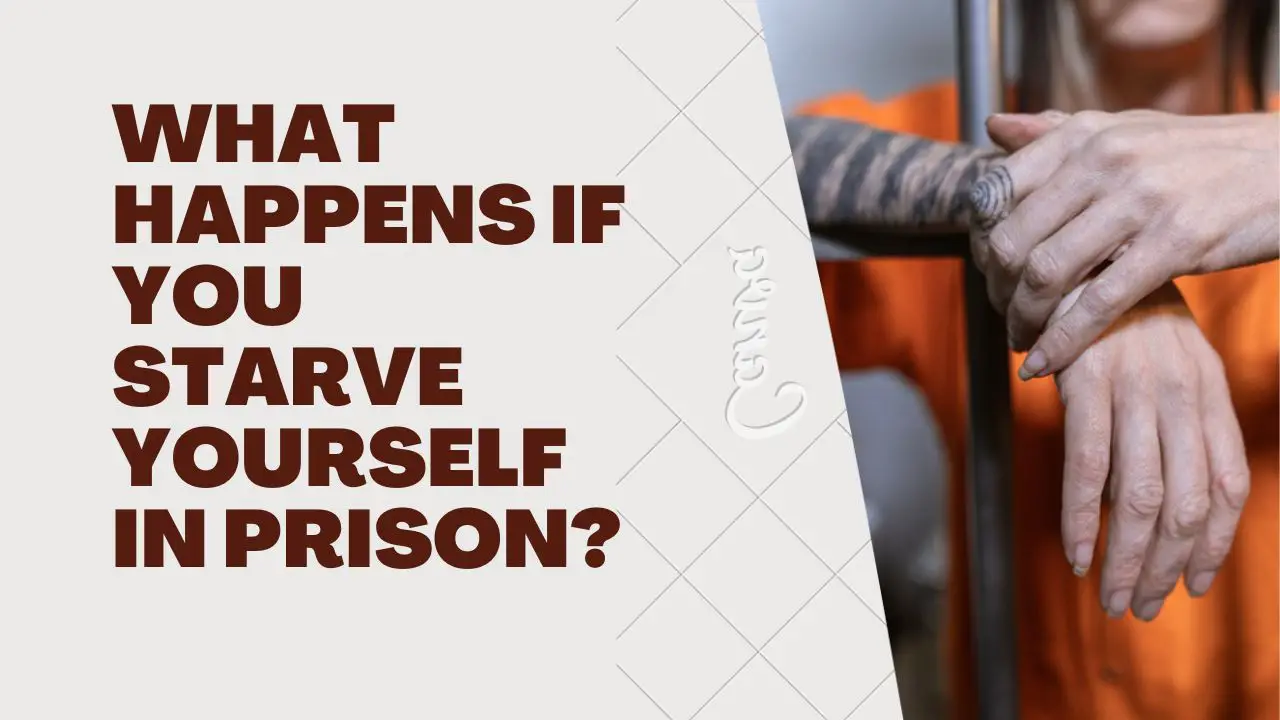What Happens if You Starve Yourself in Prison?
What Happens if You Starve Yourself in Prison? In this article, we have discussed everything if you are going to starve yourself in the prison.

With the quality of food offered at most prisons, it wouldn’t be a wonder if some stubborn inmate didn’t find it in him to resist it. Though prisoners starving themselves isn’t a common occurrence, it isn’t exactly rare either. Sometimes inmates are traumatized or have fallen into hopelessness, leading them to starvation. This can also be a method of protest by prisoners if they don’t see eye to eye with the staff.
Prisoners starving themselves to death is rare. Cases like that occur due to the facility's carelessness in monitoring its inmates and administering proper measures for the safety of all prisoners. If such a case takes place, there are legal measures that follow.
Reasons for Starvation
There are multiple reasons which can lead to starvation by prisoners. These cases are more commonly found in correctional facilities than in other prisons.
Protests by inmates can be in the form of starvation. The prisoners know that the faculty cannot afford to waste the inmates’ lives; thus, protesting against them is a weapon for the inmates. However, starvation is a double-edged sword that is only used in the extreme flouting of the prisoners' rights.
Mental Health Disorders are a fairly common cause of starvation, not just among prisoners. Disorders like anorexia are not causes of concern when considering prisoners. However, there are possibilities that prisoners, especially those in maximum security or correctional facilities, fall into starvation because of a traumatic experience or guilt from their felony.
- Sickness or some medical condition left unidentified and untreated in prisoners can lead to starvation. In some cases, inmates find themselves unable to eat prison food, leading to unchecked starvation.
- Violence committed by a guard or other inmates can lead to some inmates starving. If discipline is unchecked, prisoners might seek an easy way out, and that is simply to give in to starvation.
- Depression is a fairly common condition among prisoners. Some people simply cannot get through the upsetting idea of being sent to prison, others cannot deal with their past, and many more are frustrated by the behavior of the faculty.
How to Prevent Starvation?
One fairly common and easiest method is to force-feed the person choosing to starve himself. Prisoners going on hunger strikes has been an age-old tradition among the new inmates. It is debatable whether it is okay to force-feed prisoners, but when it comes down to the point where it is a matter of life or death, force-feeding is the only alternative.
Another remedial measure for starving prisoners is mental health counseling. The mental health of all prisoners should always be kept in observation by the prison faculty. Most prisons have counselors that provide treatments of all kinds to prisoners.
Inmate Starvation Is More Likely To Go Unnoticed
Starving yourself in prison is more likely to go unnoticed unless you begin to show it physically and cannot show up for work. Believe it or not, the correctional officers in prison aren’t paying attention to whether or not you’re physically healthy or emotionally stable.
As long as you follow their commands and directives and stay out of trouble, their work is done. The only way anyone will notice you are starving is if you were to go around announcing to everyone begging for their attention, or if you are on suicide watch in the hole because, in that situation, the officers monitor your food intake.
Self Harm In Prisons
A fairly large amount of self-harm is practiced in correctional facilities and jails. Because most prisoners aren’t great at coping with their pain and distress outside of prison, they have a hard time in prison, where their options on how to deal are severely limited.
Since they can’t just go for a walk, go for a swim, cuddle a lover, or take a relaxing bubble bath, they are left trying to figure out how to get through the difficult times without ending up in the isolation cells, also called “holes.”
Besides the usual stresses of daily life, things are made even worse because they are forced to live around so many different people with varying personalities—many of which don’t jive well with theirs.
Suicide Attempts In Prison
Another popular and self-destructive behavior that is very prevalent in prisons is cutting. It has become almost ordinary in that many inmates have either done it or still do it to alleviate the overwhelming pressure of their daily lives.
Most inmates cut their bodies in less noticeable places, as being caught will result in time spent on suicide watch in the hole. However, a fair amount also does it for attention, making sure everyone knows.
There are also many inmates each year who slit their wrists in suicide attempts. As for the facilities housing the inmates, they try to monitor the mental health of individuals with a high risk for suicide and other self-destructive behaviors. If an inmate is fearful of what they might do to themselves or others, they are placed in a suicide cell and watched closely for their protection and the safety of others.
In this situation, the inmate’s food intake is monitored, and they aren’t released from the watch until they begin eating. If someone becomes too weak and sick to stand or function properly and is noticeable enough, their medical and mental health will be addressed and dealt with, even if the person doesn’t want help.
Repercussions and Legal Actions
Legal actions would be pursued if an inmate were to die of starvation. Prisons are generally given a protocol for handling hunger strikes. It defines what should be considered a hunger strike and how to deal with the inmate at their specific stage. Usually, suppose a prisoner refuses six to eight meals. In that case, it is to be considered a hunger strike or starvation, and medical assistance of the appropriate sort is to be provided to such inmates.
On January 4, 2014, a Kentucky inmate was discovered dead. The primary cause of his death was dehydration, while the secondary cause was starvation and other medical conditions. The medical staff had denied his anxiety medication.
As a result, a prison doctor was fired, and two other staffers were dismissed. The inmate's death at the Kentucky State Penitentiary exposed lapses in medical treatment and how hunger strikes are handled at the facility. Prison officials asked prosecutors to investigate after The Associated Press began asking questions about the inmate's death.
James Kenneth Embry, 57, skipped 34 to 35 of his meals before being pronounced dead. The staff dismissed his case despite his delirium and anxiety. “By the time of his death in January of this year, he had shed more than 30 pounds on his 6-foot frame and died weighing just 138 pounds, according to documents reviewed by the AP.”
The doctors and nursing staff didn't check on inmates as they should have during routine visits. They didn’t know the protocol to follow or were told they "usually don't have to worry about it because they (the inmates) eventually give up."
Read more related articles:
- Rutledge State Prison Visiting Information, History of This Facility, Inmates Phone, Mail, And FAQ About This Prison
- Ferguson Unit: Visiting Information, History of This Facility, Inmates Phone, Mail, And FAQ About This Prison
- Active Inmates List In Hancock County Jail & Everything You Need To Know About This Facility
- Pickaway County Active Inmates: How to search for Active Inmates of Pickaway County Prison
- Trumbull County Jail: Brief Overview Visiting Hours, Inmate Phones, And Sherif's Location
- Craighead County Detention Center: Sherif's Office and How to Contact Inmates?
- Byrd Unit Texas: Everything You Need To Know About This Facility
